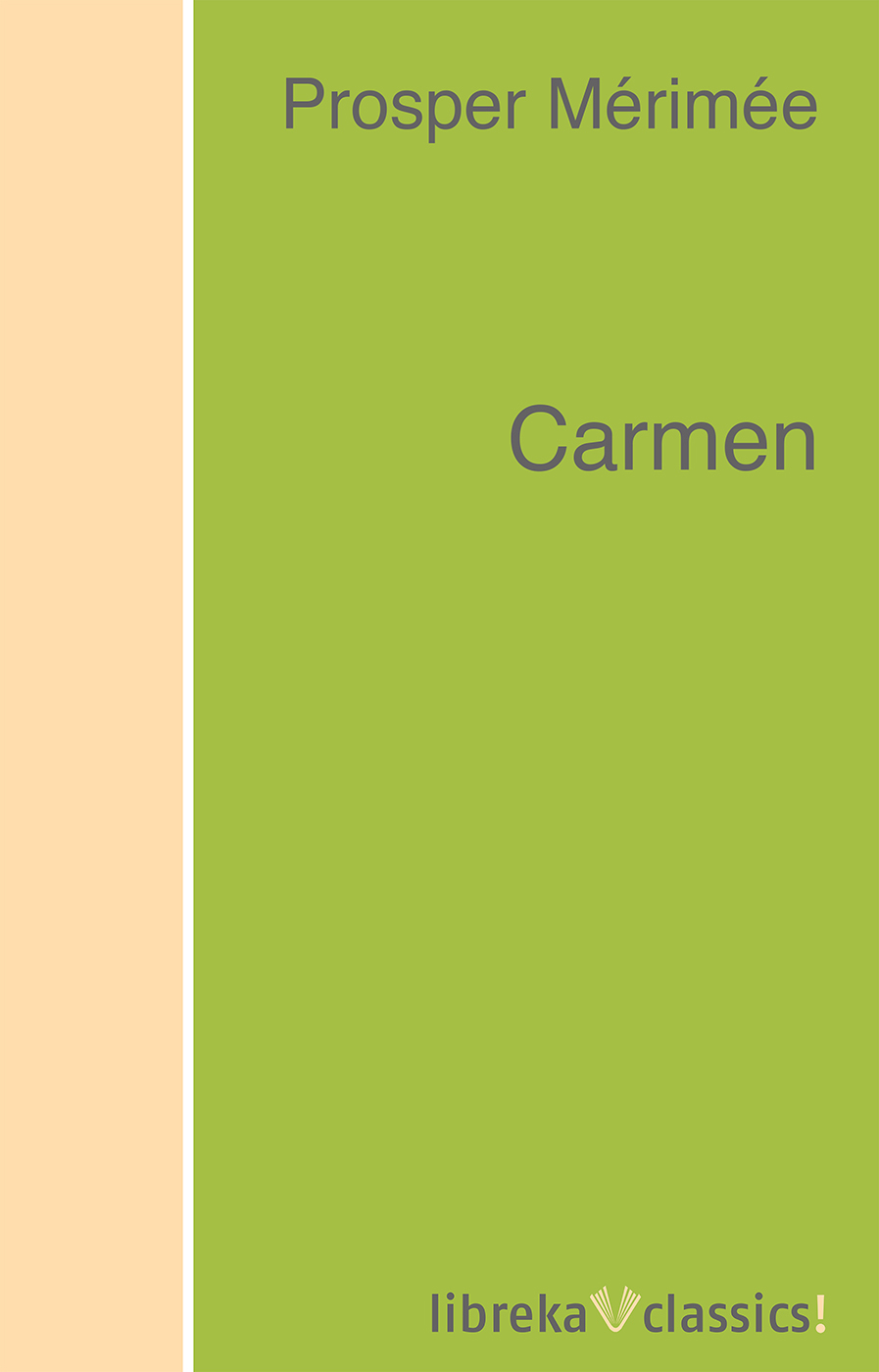
Carmen


Titel: Carmen
von ca. 337-422 Faxian, Sir Samuel White Baker, Sax Rohmer, Bernardin de Saint-Pierre, Maria Edgeworth, Saint Sir Thomas More, Herodotus, L. Mühlbach, Herbert Allen Giles, G. K. Chesterton, Algernon Charles Swinburne, Rudyard Kipling, A. J. O'Reilly, William Bray, O. Henry, graf Leo Tolstoy, Anonymous, Lewis Wallace, Johann Wolfgang von Goethe, Edgar Allan Poe, Jack London, Elizabeth Cleghorn Gaskell, Jules Verne, Frank Frankfort Moore, Susan Fenimore Cooper, Anthony Trollope, Henry James, T. Smollett, Thomas Burke, Emma Goldman, George Eliot, Henry Rider Haggard, Baron Thomas Babington Macaulay Macaulay, A. Maynard Barbour, Edmund Burke, Gerold K. Rohner, Bernard Shaw, Sir Joshua Reynolds, Bret Harte, Nathaniel Hawthorne, Jerome K. Jerome, Isabella L. Bird, Christoph Martin Wieland, Rainer Maria Rilke, Ludwig Anzengruber, Freiherr von Ludwig Achim Arnim, G. Harvey Ralphson, John Galsworthy, George Sand, Pierre Loti, Fyodor Dostoyevsky, Giambattista Basile, Homer, John Webster, P. G. Wodehouse, William Shakespeare, Edward Payson Roe, Sir Walter Raleigh, Victor [pseud.] Appleton, Arnold Bennett, James Fenimore Cooper, James Hogg, Richard Harding Davis, Ernest Thompson Seton, William MacLeod Raine, E. Phillips Oppenheim, Maksim Gorky, Henrik Ibsen, George MacDonald, Sir Max Beerbohm, Lucy Larcom, Various, Sir Robert S. Ball, Charles Darwin, Charles Reade, Adelaide Anne Procter, Joseph Conrad, Joel Chandler Harris, Joseph Crosby Lincoln, Alexander Whyte, Kate Douglas Smith Wiggin, James Lane Allen, Richard Jefferies, Honoré de Balzac, Wilhelm Busch, General Robert Edward Lee, Charles Dickens, Wilkie Collins, David Cory, Booth Tarkington, George Rawlinson, Sir Arthur Conan Doyle, Dinah Maria Mulock Craik, Christopher Evans, Thomas Henry Huxley, Mary Roberts Rinehart, Erskine Childers, Alice Freeman Palmer, Florence Converse, William Congreve, Stephen Crane, Madame de La Fayette, United States. Army. Corps of Engineers. Manhattan District, Willa Sibert Cather, Anna Katharine Green, Oliver Wendell Holmes, Charlotte M. Brame, Alphonse Daudet, Booker T. Washington, Clemens Brentano, Sylvester Mowry, Geoffrey Chaucer, Ellen Anderson Gholson Glasgow, Gail Hamilton, William Roscoe Thayer, Margaret Wade Campbell Deland, Rafael Sabatini, Archibald Henderson, Albert Payson Terhune, George Wharton James, Padraic Colum, James MacCaffrey, John Albert Macy, Annie Sullivan, Helen Keller, Walter Pater, Sir Richard Francis Burton, Baron de Jean-Baptiste-Antoine-Marcelin Marbot, Aristotle, Gustave Flaubert, 12th cent. de Troyes Chrétien, Valentine Williams, Thomas Wentworth Higginson, Alexandre Dumas fils, John Gay, Andrew Lang, Hester Lynch Piozzi, Jeffery Farnol, Alexander Pope, George Henry Borrow, Mark Twain, Francis Bacon, Margaret Pollock Sherwood, Henry Walter Bates, Thornton W. Burgess, Edmund G. Ross, William Alexander Linn, Voltaire, Giles Lytton Strachey, Henry Ossian Flipper, Émile Gaboriau, Arthur B. Reeve, Hugh Latimer, Baron Edward Bulwer Lytton Lytton, Benito Pérez Galdós, Robert Smythe Hichens, Niccolò Machiavelli, Prosper Mérimée
ISBN 978-3-7429-2372-1
Alle Rechte vorbehalten.
Es ist ohne vorherige schriftliche Erlaubnis nicht gestattet, dieses Werk im Ganzen oder in Teilen zu vervielfältigen oder zu veröffentlichen.
CARMEN
by Prosper Merimee
Translated by Lady Mary Loyd
Contents
CHAPTER I CHAPTER II CHAPTER III CHAPTER IVCHAPTER I
I had always suspected the geographical authorities did not know what they were talking about when they located the battlefield of Munda in the county of the Bastuli-Poeni, close to the modern Monda, some two leagues north of Marbella.
According to my own surmise, founded on the text of the anonymous author of the Bellum Hispaniense, and on certain information culled from the excellent library owned by the Duke of Ossuna, I believed the site of the memorable struggle in which Caesar played double or quits, once and for all, with the champions of the Republic, should be sought in the neighbourhood of Montilla.
Happening to be in Andalusia during the autumn of 1830, I made a somewhat lengthy excursion, with the object of clearing up certain doubts which still oppressed me. A paper which I shall shortly publish will, I trust, remove any hesitation that may still exist in the minds of all honest archaeologists. But before that dissertation of mine finally settles the geographical problem on the solution of which the whole of learned Europe hangs, I desire to relate a little tale. It will do no prejudice to the interesting question of the correct locality of Monda.
I had hired a guide and a couple of horses at Cordova, and had started on my way with no luggage save a few shirts, and Caesar's Commentaries. As I wandered, one day, across the higher lands of the Cachena plain, worn with fatigue, parched with thirst, scorched by a burning sun, cursing Caesar and Pompey's sons alike, most heartily, my eye lighted, at some distance from the path I was following, on a little stretch of green sward dotted with reeds and rushes. That betokened the neighbourhood of some spring, and, indeed, as I drew nearer I perceived that what had looked like sward was a marsh, into which a stream, which seemed to issue from a narrow gorge between two high spurs of the Sierra di Cabra, ran and disappeared.
If I rode up that stream, I argued, I was likely to find cooler water, fewer leeches and frogs, and mayhap a little shade among the rocks.
At the mouth of the gorge, my horse neighed, and another horse, invisible to me, neighed back. Before I had advanced a hundred paces, the gorge suddenly widened, and I beheld a sort of natural amphitheatre, thoroughly shaded by the steep cliffs that lay all around it. It was impossible to imagine any more delightful halting place for a traveller. At the foot of the precipitous rocks, the stream bubbled upward and fell into a little basin, lined with sand that was as white as snow. Five or six splendid evergreen oaks, sheltered from the wind, and cooled by the spring, grew beside the pool, and shaded it with their thick foliage. And round about it a close and glossy turf offered the wanderer a better bed than he could have found in any hostelry for ten leagues round.
The honour of discovering this fair spot did not belong to me. A man was resting there already—sleeping, no doubt—before I reached it. Roused by the neighing of the horses, he had risen to his feet and had moved over to his mount, which had been taking advantage of its master's slumbers to make a hearty feed on the grass that grew around. He was an active young fellow, of middle height, but powerful in build, and proud and sullen-looking in expression. His complexion, which may once have been fine, had been tanned by the sun till it was darker than his hair. One of his hands grasped his horse's halter. In the other he held a brass blunderbuss.
At the first blush, I confess, the blunderbuss, and the savage looks of the man who bore it, somewhat took me aback. But I had heard so much about robbers, that, never seeing any, I had ceased to believe in their existence. And further, I had seen so many honest farmers arm themselves to the teeth before they went out to market, that the sight of firearms gave me no warrant for doubting the character of any stranger. "And then," quoth I to myself, "what could he do with my shirts and my Elzevir edition of Caesar's Commentaries?" So I bestowed a friendly nod on the man with the blunderbuss, and inquired, with a smile, whether I had disturbed his nap. Without any answer, he looked me over from head to foot. Then, as if the scrutiny had satisfied him, he looked as closely at my guide, who was just coming up. I saw the guide turn pale, and pull up with an air of evident alarm. "An unlucky meeting!" thought I to myself. But prudence instantly counselled me not to let any symptom of anxiety escape me. So I dismounted. I told the guide to take off the horses' bridles, and kneeling down beside the spring, I laved my head and hands and then drank a long draught, lying flat on my belly, like Gideon's soldiers.
Meanwhile, I watched the stranger, and my own guide. This last seemed to come forward unwillingly. But the other did not appear to have any evil designs upon us. For he had turned his horse loose, and the blunderbuss, which he had been holding horizontally, was now dropped earthward.
Not thinking it necessary to take offence at the scant attention paid me, I stretched myself full length upon the grass, and calmly asked the owner of the blunderbuss whether he had a light about him. At the same time I pulled out my cigar-case. The stranger, still without opening his lips, took out his flint, and lost no time in getting me a light. He was evidently growing tamer, for he sat down opposite to me, though he still grasped his weapon. When I had lighted my cigar, I chose out the best I had left, and asked him whether he smoked.
"Yes, senor," he replied. These were the first words I had heard him speak, and I noticed that he did not pronounce the letter s* in the Andalusian fashion, whence I concluded he was a traveller, like myself, though, maybe, somewhat less of an archaeologist.
"You'll find this a fairly good one," said I, holding out a real Havana regalia.
He bowed his head slightly, lighted his cigar at mine, thanked me with another nod, and began to smoke with a most lively appearance of enjoyment.
"Ah!" he exclaimed, as he blew his first puff of smoke slowly out of his ears and nostrils. "What a time it is since I've had a smoke!"
Вы ознакомились с фрагментом книги.
Для бесплатного чтения открыта только часть текста.
Приобретайте полный текст книги у нашего партнера:
Полная версия книги
